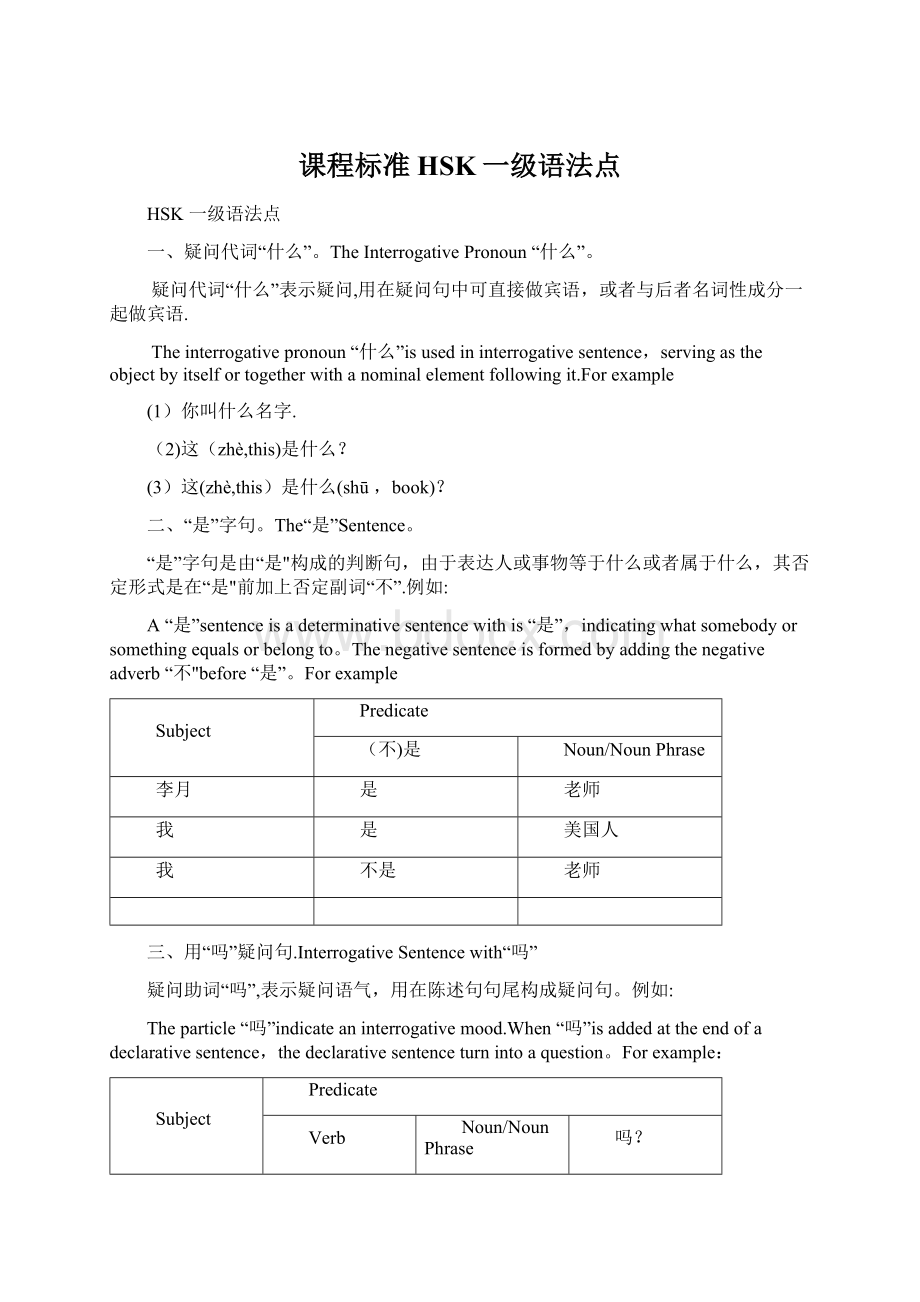课程标准HSK一级语法点.docx
《课程标准HSK一级语法点.docx》由会员分享,可在线阅读,更多相关《课程标准HSK一级语法点.docx(17页珍藏版)》请在冰豆网上搜索。

课程标准HSK一级语法点
HSK一级语法点
一、疑问代词“什么”。
TheInterrogativePronoun“什么”。
疑问代词“什么”表示疑问,用在疑问句中可直接做宾语,或者与后者名词性成分一起做宾语.
Theinterrogativepronoun“什么”isusedininterrogativesentence,servingastheobjectbyitselfortogetherwithanominalelementfollowingit.Forexample
(1)你叫什么名字.
(2)这(zhè,this)是什么?
(3)这(zhè,this)是什么(shū,book)?
二、“是”字句。
The“是”Sentence。
“是”字句是由“是"构成的判断句,由于表达人或事物等于什么或者属于什么,其否定形式是在“是"前加上否定副词“不”.例如:
A“是”sentenceisadeterminativesentencewithis“是”,indicatingwhatsomebodyorsomethingequalsorbelongto。
Thenegativesentenceisformedbyaddingthenegativeadverb“不"before“是”。
Forexample
Subject
Predicate
(不)是
Noun/NounPhrase
李月
是
老师
我
是
美国人
我
不是
老师
三、用“吗”疑问句.InterrogativeSentencewith“吗”
疑问助词“吗”,表示疑问语气,用在陈述句句尾构成疑问句。
例如:
Theparticle“吗”indicateaninterrogativemood.When“吗”isaddedattheendofadeclarativesentence,thedeclarativesentenceturnintoaquestion。
Forexample:
Subject
Predicate
Verb
Noun/NounPhrase
吗?
你
是
中国人
吗?
你
是
美国人
吗?
你
是
老师
吗?
四、疑问代词“谁”、“哪"TheInterrogativePronouns“谁”and“哪”
(一)、疑问代词“谁”在疑问句中用来询问人。
例如:
Theinterrogativepronoun“谁”isusedtoaskaboutthenameoridentityofaperson。
Forexample:
Subject
Verb
Object
谁
是
李月?
他
是
谁?
她
是
谁?
(二)、疑问代词“哪”用在疑问句中的结构形式为:
哪+量词/名词+名词。
例如
Whentheinterrogativepronoun“哪”isusedinaquestion,thestructureis“哪+measureword/noun+noun”Forexample:
(1)哪本(běn,ameasurewordforbooks)书(shū,book)?
(2)哪个(gè,ageneralmeasureword)人?
(3)你是哪国人?
五、结构助词“的"Thestructuralparticle“的"
名词/代词+的+名词表达一种所属关系。
当“的"后的名词是亲属称谓或者指人的名词时,“的”可以省略。
例如:
Thestructure“noun/pronoun+的+noun"indicatepossession。
Whenthenounfollowing“的”isaternofkinshiporindicateaperson,“的”canbeomitted。
Forexample:
(1)李月是我的汉语老师。
(2)这(zhè,this)是我的书(shū,book)。
(3)她不是我同学,她是我朋友。
六、疑问助词“呢"
(1)TheInterrogativeParticle“呢”
(1)
疑问助词“呢"用在名词后或代词后构成疑问句,用于询问上文提到的情况。
常用的句式是:
A。
。
。
.。
...。
.。
B呢?
例如:
TheInterrogativeparticle“呢”isusedafteranounorpronoun,formingaquestionaboutthesituationmentionedpreviously.Thecommonlyusedsentencepatternis“A.。
。
。
。
...B呢?
”(A..。
.。
.。
WhataboutB)。
Forexample:
(1)我不是老师,我是学生.你呢?
(2)她叫李月,他呢?
(3)我是美国人。
你呢?
七、疑问代词“几"TheInterrogativePronoun“几"
疑问代词“几”是用来询问数量的多少,一般用于询问10以下的数字。
例如:
Theinterrogativepronoun“几”isusedtoaskaboutanumber,usuallylessthan10.Forexample
(1)你有几个汉语老师?
(2)李老师家有几口人?
(3)你女儿几岁了?
八、百以内的数字Numberbelow100
1yī
2èr
3sān
4sì
5wǔ
6liù
7qī
8bā
9jiǔ
10shí
20èrshí
23
èrshísān
30sānshí
40sìshí
50wǔshí
56
Wǔliù
60liùshí
70qīshí
80bāshí
88
bāshíbā
90jiǔshí
99
jiǔshíjiǔ
九、“了”表变化“了”IndicatingaChange
“了:
用于句末,表示变化或新情况的出现。
例如:
“了"isusedattheendofasentencetoindicateachangeortheoccurrenceofanewsituation.Forexample:
(1)李老师今年50岁了。
(2)我朋友的女儿今年四岁了。
(3)你女儿几岁了?
十、“多+大”表示疑问TheInterrogativePhrase“多+大”
“多+大”在句子中表示疑问,用于询问年龄。
例如:
“多+大”isusedtoaskaboutone’sage.Forexample:
(1)你多大了?
(2)你女儿今年多大了?
(3)李老师多大了?
十一、能愿动词“会”
(1)TheModalVerb“会”
(1)
能愿动词“会”用在动词前表示通过学习而获得某种能力,它的否定形式是“不会"。
例如:
Themodalverb“会”isusedbeforeaverb,indicatingacquiringabilitythroughlearning.Itsnegativeformis“不会”。
Forexample:
Subject
(不)会
Verb
我
会
写汉字
我
不会
做中国菜
你妈妈
会
说汉语吗?
十二、形容词谓语句SentencewithanAdjectivalPredicate
形容词可以用在主语+程度副词+形容词这个结构中,描述人或者事物的性质或者状态,程度副词经常用“很”。
否定形式为主语+不+形容词.例如:
Usedinthestructure”subject+adverbofdegree+adjective”,theadjectivedescribesthenatureorstateofsomebodyorsomething,usuallyfollowingtheadverbofdegree“很”。
Thenegativeformis“subject+不+adjective”.Forexample:
Subject
AdverbofDegree/不
Adjective
我
很
好
我妈妈的汉语
不
好
中国菜
很
好吃
十三、疑问代词“怎么”
(1)TheInterrogativePronoun“怎么”
(1)
疑问代词“怎么”用在动词前,询问动作的方式。
例如
TheInterrogativepronoun“怎么”isusedbeforeaverbtoaskaboutthemannerofanaction.Forexample:
(1)这个汉字怎么读?
(2)你的汉语名字怎么写?
(3)这个字怎么写?
十四、日期的表达
(1):
月、日(rì,date)/号、星期
ExpressofaDate
(1):
month,date,dayoftheweek
汉语的日期表达方式遵循由大小的原则,先说“月”,然后说“日/号”,最后说“星期".口语一般常用“号”。
例如:
ThewaytosayadateinChineseobservedtheprincipleof“thebiggerunitcomingbeforethesmallerone“,Themonthissaidfirst,thenthedateandfinallythedayoftheweek。
InspokenChinese,“号”isoftenusedinsteadof“日”toexpressthedate.Forexample:
(1)9月1号,星期三。
(2)9月2号,星期四。
(3)8月31号,星期二。
十五、名词谓语句是SentencewithaNominalPredicate
名词谓语句是谓语部分由名词性成分充当的句子,一般用于表达年龄、时间、日期等。
例如:
AsentencewithanominalPredicateisasentencewhosePredicateisanominalelement。
Itisusuallyusedtoindicateage,time,dateandsoon.Forexample
Subject
Predicate
我的汉语老师
33岁
明天
星期二
今天
9月1号
十六、连动句
(1):
去+地方+做什么
SentencewithaSerialVerbConstruction
(1)去+place+todosth
连动句的谓语部分是由两个或者